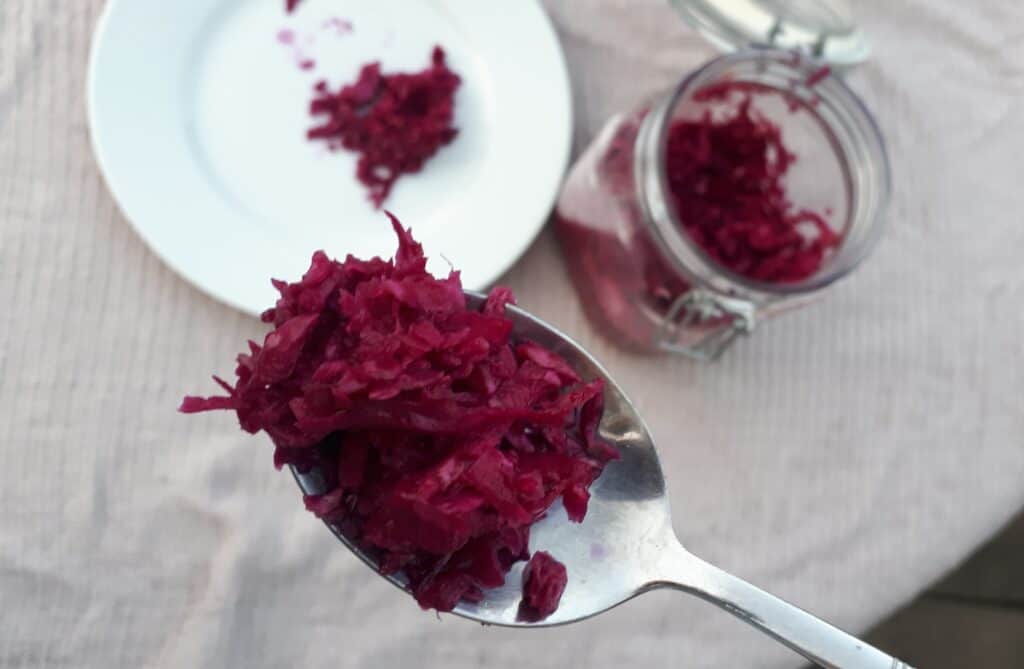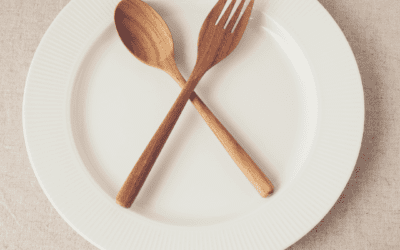You’ve probably heard someone recommend fermented foods are a good idea for improving gut health, but are fermented foods good for IBS?
What are fermented foods?
Fermented foods include foods like:
- yoghurt (fermented milk)
- kefir (fermented milk)
- sauerkraut (fermented cabbage)
- kimchi (Korean fermented spicy vegetables)
- tempeh (fermented soya)
- kombucha (fermented tea)
The benefits of fermented foods

The process of fermentation involves beneficial micro-organisms breaking down the sugars and starches, which helps preserve the foods.
The beneficial bacteria and yeasts remain in the food when we eat it, and they are good for us, sometimes called probiotics. Probiotics have been shown in several studies to improve gut bacteria diversity, support the integrity of gut mucus membranes and help support immunity.
Fermentation can help some people with IBS by partially pre-digesting the sugars. For example the fructans in bread were found to be lower when the dough was fermented with a specific strain of yeast.
But wait! It’s not all good news…
Fermenting can increase FODMAPS
The Monash University found white cabbage sauerkraut was higher in FODMAPS than cabbage. How?
Well, white cabbage is low in FODMAPS, but through the fermenting process the fructose is released and converted to mannitol (a Polyol). It’s considered low FODMAP up to a tablespoon, but high FODMAP at 75g / quarter of a cup. This could be the same for kimchi.
Fermented foods for IBS
One food isn’t going to make or break your symptoms, it’s all about context and your overall diet patterns.

Should you eat sauerkraut if you have IBS?
Eating fermented cabbage may help improve your IBS symptoms.
- A small study in 2018 showed eating sauerkraut for 6 weeks improved the IBS symptom severity and gut microbiome (it was only 34 people). This could be due to the positive effect of adding beneficial microbes into the gut. Even the pasteurised version of sauerkraut (with no live bacteria) had a significant beneficial impact on the gut bacteria which is probably down to the pre-biotic content of the cabbage (fibre feeds the beneficial bacteria).
- Another study in 2022 reduced symptoms of IBS when participants ate 210g kimchi for 12 weeks. Kimchi is Korean fermented cabbage and participants had improvement in defecation time and stool type.
Is Kefir better than milk for IBS?
Fermented dairy may be easier for you to digest if you struggle with dairy intolerance. Live bacteria break down lactose in the fermentation process. One study found yogurts and kefir reduced the perceived severity of flatulence by 54% to 71% compared to milk.
(This won’t help you if you have a dairy allergy though, you still need to avoid kefir.)
Low FODMAP fermented foods
Also – if you’re dairy free you can sometimes find coconut or soy kefir.
However, some people with IBS will also react to these products as well.
Can I buy fermented foods for IBS?
- It can be cheaper to make your own – and relatively easy.
- If you buy fermented foods check your product isn’t pasteurised which means all the beneficial bacteria will be killed off. Look out for markings of Live bacteria or probiotic bacteria on the label.
How to start using fermented foods for IBS
Start slowly. Don’t eat a whole jar of sauerkraut or gulp down a whole carton of kefir if you haven’t tried it before. Start with a small amount, notice any reactions.
Fermented foods can be a great way to support a healthy balanced diet. If they don’t work for you, it’s not essential to include them.

IBS Nutritionist
Hi, I'm Anna Mapson, registered Nutritional Therapist.
I help people with IBS and SIBO get control of unpredictable gut symptoms to find long term relief from painful and embarrassing IBS without restrictive dieting.
I can help you to:
- understand your digestion better, so you recognise your triggers
- eat a well balanced diet, with tasty meals that are simple to prepare
- reintroduce your trigger foods so you can get back to enjoying food again
Find more about my 3 month 1:1 Gut Reset programme.
How to reintroduce foods after an elimination diet
When you’ve avoided certain foods for a really long time it can be difficult to start eating them again. Many of my clients really worry about reintroducing foods again. This is really understandable. If you've managed to reduce painful or embarrassing digestive...
IgG food Intolerance test – Should I get a test for IBS?
As a nutritionist working with IBS I’ve spoken to hundreds of people looking for cures for their digestive issues. If you’re searching for a solution, and tempted to get a food intolerance test then my short answer is no, don't get an IgG test, save your money. For a...
Does IBS run in the family?
Does IBS run in your family? I always ask my IBS clients if their parents have ongoing gut issues, or if anything runs in the family to understand the family picture.It's likely that someone else in your family also has IBS. In one study IBS prevalence was 17% in...





I have IBS and need help ! Can you tell me why I would have so many bm’s every day ? I try to eat solid food more .
Frequent bowel movements can be down to a number of different things such as stress / anxiety, gut bacteria, food intolerance or lack of digestive enzymes. Have you tried keeping a food diary? This can be a good place to start to see if there are certain triggers or events that worsen your symptoms. You don’t say how many poos you have a day, but just in case you aren’t aware 1-3 per day is considered normal. If it’s a lot more than that I’d start with a visit to the doctor if you haven’t already. Eating foods which help form a gel in our gut might help you, such as chia seeds or flax seeds. These help form a stool and can slow transit time a little. Let me know if you’d like personal help with your diet, I offer a 3 month programme with 1:1 coaching calls to help you find a diet that works for you – https://www.goodnessme-nutrition.com/consultations/
I have IbS and I’m also type one diabetes. I have found that there are foods that are not codusive to both. Conditions. I’m trying to ear smart, but I’m having a difficult time with the ibs .